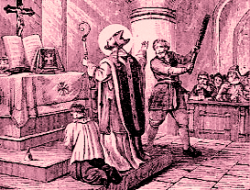Lives of the Saints
Our Models and Protectors
Spiritual Bouquet:
November 14

Saint Laurence O’Toole
Archbishop of Dublin, Martyr
(1125-1180)
Saint Laurence was the son of the king of Leinster in Ireland, born about the year 1125. His birth caused such great joy to his father, that in thanksgiving, to honor Christ, he pardoned a vassal who was an enemy and even chose him for sponsor of the child. They were stopped on the way to church by a man who was regarded as a prophet, and who told them in verse that the child would be magnificent on earth and glorious in heaven, and that his name must be Laurence. Though the king had decided otherwise, the infant was indeed given that name of predilection.
When only ten years old, his father delivered him up as a hostage to a rival prince who required this gage of his sincerity when there was a question of a treaty of peace, but who treated the child with great inhumanity, leaving him to suffer hunger and cold and other incommodities until his health was nearly ruined. His father, hearing of this, by menaces obliged the tyrant to put him temporarily in the hands of the Bishop of Glendenoch in the county of Wicklow. The holy youth was soon cured and, by his fidelity in corresponding with the divine grace, he grew to be a model of virtues. When his father came for him, he declared he desired to enter into the service of the Church and remain with the good bishop. To this his father willingly agreed.
On the death of the bishop, who was also Abbot of a monastery of the same city, Saint Laurence was chosen Abbot in 1150, though only twenty years old, and doubting his competence. Nonetheless he governed with a paternal spirit, employing all his revenues during a famine in the province, to procure food for the needy, remedies for the sick, and aid of all kinds for the unfortunate. Never did he use his revenues, even when prosperity returned, for anything but care of the poor, repairs for ruined or decrepit churches or the construction of new ones, and the foundation of hospitals. When the see of Glendenoch became vacant once more in 1161, it was Saint Laurence who was chosen to fill it; and although he could not resolve to accept that new dignity, he was obliged soon afterwards to become Archbishop of Dublin, and he was told that to refuse would be to resist the Will of God.
He established a regular life for the Canons of his cathedral, according to the example of Saint Augustine, and he himself followed all the rules with exactitude, sharing their table, their prayer and their silence. Each year he made a retreat of forty days in a cavern a few miles from the city, fasting on bread, water and vegetables. When he came forth afterwards he preached with so much zeal against the disorders of the province, that even hardened hearts could not resist the force of his words.
About the year 1171 Saint Laurence was obliged, for the affairs of his diocese, to go to England to see the king, Henry II, who was then at Canterbury. He was received by the Benedictine monks of Christ Church with the greatest honor and respect. On the following day, as the holy Archbishop was advancing to the altar to officiate, a maniac, who had heard much of his sanctity and who thought it would be a gift to the Church to make of him another martyr in the likeness of Saint Thomas Becket, struck him a violent blow on the head. All present concluded that he was mortally wounded; but the Saint recovered his senses and asked for some water, which he blessed. He then requested that the wound be washed with it, and the blood was immediately stanched; and the archbishop celebrated Mass. He obtained the offender's pardon from the king. His prayers brought about many miracles, including the return to their senses for those who had become alienated, a miracle rare in the history of religion. After he attended a General Council in Rome in 1179, the Pope made him his legate for all of Ireland, and he visited all its provinces to re-establish ecclesiastical discipline everywhere.
In 1175 Henry II of England became offended with Roderick, the monarch of Ireland, and Saint Laurence undertook another journey to England to negotiate a reconciliation between them. Henry was so moved by his piety, charity and prudence that he granted him everything he asked, and left the whole negotiation to his discretion. Saint Laurence died while still in France, in the city of Eu on the border of Normandy and Picardy. He was unable to make a testament, as this perfect Archbishop had given all he had, and literally had nothing to leave to others. He ended his journey here below on the 14th of November, 1180, and was buried in the church of the abbey at Eu.
Les Petits Bollandistes: Vies des Saints, by Msgr. Paul Guérin (Bloud et Barral: Paris, 1882), Vol. 13